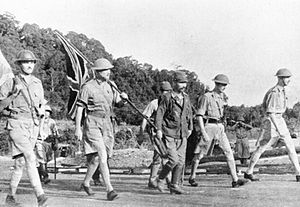Fall of Singapore
| Battle of Singapore | |||||||
|---|---|---|---|---|---|---|---|
| Part of the Pacific Theatre of World War II | |||||||
 Lieutenant-General Arthur Ernest Percival, led by a Japanese officer, walks under a flag of truce to negotiate the capitulation of Allied forces in Singapore, on 15 February 1942. It was the largest surrender of British-led forces in history. |
|||||||
|
|||||||
| Belligerents | |||||||
|
|
|
||||||
| Commanders and leaders | |||||||
|
|
|
||||||
| Units involved | |||||||
|
|
|||||||
| Strength | |||||||
| 85,000 300 artillery pieces 1,800+ trucks 200 AFVs 208 anti-tank and anti-aircraft guns 54 fortress guns |
36,000 440 artillery pieces 3,000 trucks |
||||||
| Casualties and losses | |||||||
| ~5,000 killed or wounded 80,000 captured |
1,714 killed 3,378 wounded |
||||||
The Battle of Singapore, also known as the Fall of Singapore, was fought in the South-East Asian theatre of World War II when the Empire of Japan invaded the British stronghold of Singapore—nicknamed the "Gibraltar of the East". Singapore was the major British military base in South-East Asia and was the keystone of British imperial interwar defence planning for South-East Asia as well as the South-West Pacific. The fighting in Singapore lasted from 8 to 15 February 1942 although this was preceded by two months of British resistance as Japanese forces advanced down the Malaya peninsula.
...
Wikipedia
